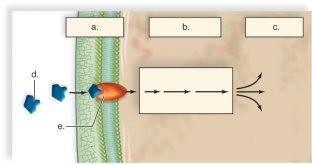Exam 24: Control of Growth Responses in Plants
Exam 1: Biology, the Study of Life50 Questions
Exam 2: Basic Chemistry of Cells53 Questions
Exam 3: Organic Molecules of Cells54 Questions
Exam 4: Structure and Function of Cells56 Questions
Exam 5: Dynamic Activities of Cells50 Questions
Exam 6: Pathways of Photosynthesis51 Questions
Exam 7: Pathways of Cellular Respiration51 Questions
Exam 8: Cellular Reproduction50 Questions
Exam 9: Sexual Reproduction50 Questions
Exam 10: Patterns of Genetic Inheritance50 Questions
Exam 11: Molecular Biology of Inheritance49 Questions
Exam 12: Regulation of Gene Activity50 Questions
Exam 13: Biotechnology and Genomics52 Questions
Exam 14: Evidence of Evolution53 Questions
Exam 15: Speciation and Evolution49 Questions
Exam 16: The Evolutionary History of Life on Earth50 Questions
Exam 17: Evolution of Microbial Life50 Questions
Exam 18: Evolution of Protists50 Questions
Exam 19: Evolution of Plants and Fungi53 Questions
Exam 20: Evolution of Animals50 Questions
Exam 21: Evolution of Humans49 Questions
Exam 22: Plant Organization and Homeostasis50 Questions
Exam 23: Transport and Nutrition in Plants50 Questions
Exam 24: Control of Growth Responses in Plants50 Questions
Exam 25: Reproduction in Plants50 Questions
Exam 26: Animal Organization and Homeostasis63 Questions
Exam 27: Coordination by Neural Signaling64 Questions
Exam 28: Sense Organs64 Questions
Exam 29: Locomotion and Support Systems58 Questions
Exam 30: Circulation and Cardiovascular Systems59 Questions
Exam 31: Lymph Transport and Immunity57 Questions
Exam 32: Digestive Systems and Nutrition59 Questions
Exam 33: Gas Exchange and Transport in Animals56 Questions
Exam 34: Osmoregulation and Excretion57 Questions
Exam 35: Coordination by Hormone Signaling59 Questions
Exam 36: Reproduction and Development60 Questions
Exam 37: Population Ecology56 Questions
Exam 38: Behavioral Ecology59 Questions
Exam 39: Community and Ecosystem Ecology59 Questions
Exam 40: Major Ecosystems of the Biosphere58 Questions
Exam 41: Conservation Biology56 Questions
Select questions type
If you were interested in slowing down or preventing senescence,you would most likely use which of plant hormones?
(Multiple Choice)
4.8/5  (40)
(40)
If you were a biologist studying the coiling response in morning glory plants,what would you be studying?
(Multiple Choice)
4.7/5  (35)
(35)
When a plant changes growth in response to a light stimulus,what is that called?
(Multiple Choice)
4.8/5  (37)
(37)
If you were studying plant hormones which encourage apical dominance by preventing the growth of axillary buds,you would be studying which hormone?
(Multiple Choice)
4.7/5  (33)
(33)
 -This figure shows the signal transduction pathway in plants.What does "b" represent?
-This figure shows the signal transduction pathway in plants.What does "b" represent?
(Multiple Choice)
4.9/5  (47)
(47)
A plant physiologist is studying plants which flower when the day length is shorter than a critical length,such as goldenrod and poinsettia,which implies that these are
(Multiple Choice)
4.8/5  (38)
(38)
Which is a medicinal chemical produced by an organism other than a plant?
(Multiple Choice)
4.8/5  (40)
(40)
An unequal growth due to contact with a solid object is referred to as
(Multiple Choice)
4.8/5  (24)
(24)
If a biologist is studying chemical defense in plants,what kind of chemical would be the subect of the study?
(Multiple Choice)
4.7/5  (33)
(33)
Which of the following statements is true about turgor movements?
(Multiple Choice)
4.8/5  (40)
(40)
Showing 41 - 50 of 50
Filters
- Essay(0)
- Multiple Choice(0)
- Short Answer(0)
- True False(0)
- Matching(0)